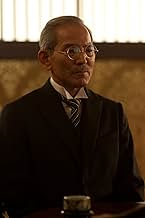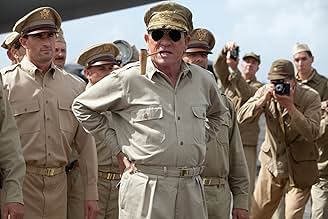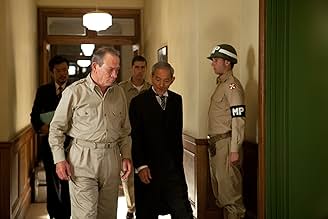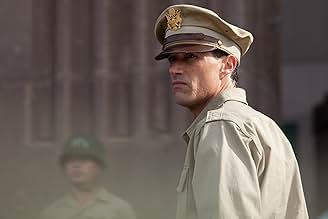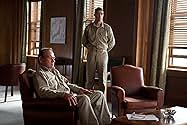As the Japanese surrender at the end of World War II, General Fellers is tasked with deciding if Emperor Hirohito will be hanged as a war criminal. Influencing his ruling is his quest to fin... Read allAs the Japanese surrender at the end of World War II, General Fellers is tasked with deciding if Emperor Hirohito will be hanged as a war criminal. Influencing his ruling is his quest to find Aya, an exchange student he met years earlier in the U.S.As the Japanese surrender at the end of World War II, General Fellers is tasked with deciding if Emperor Hirohito will be hanged as a war criminal. Influencing his ruling is his quest to find Aya, an exchange student he met years earlier in the U.S.
- Director
- Writers
- Stars
- Awards
- 1 nomination total
- Director
- Writers
- All cast & crew
- Production, box office & more at IMDbPro
Featured reviews
While Tommy Lee Jones relishes in playing every Tommy Lee Jones character ever (stealing all the best lines in the process) as the hard-nosed but cunning General MacArthur, Fox delivers a more grounded and arresting performance as Bonner Fellers, a man torn between his moral obligations and his duty to the army, and to an American public crying out for blood.
Director Peter Webber infuses a romantic subplot with Fellers' Japanese girlfriend Aya (Eriko Hatsune) neatly, filling a role but never interjecting into a story that, quite frankly, is underscored by the power of men post-war. When MacArthur finally comes face-to-face with the Emperor after an excruciating build-up, the scene's emotional force and intense interplay perfectly resonate the best attributes of this vastly underrated drama.
*There's nothing I love more than a bit of feedback, good or bad. So drop me a line on jnatsis@iprimus.com.au and let me know what you thought of my review. If you're looking for a writer for your movie website or other publication, I'd also love to hear from you.*
Tommy Lee Jones is plainly having lots of fun as the blustering larger- than-life Douglas MacArthur, and Matthew Fox delivers a good performance with moments of extreme intensity. Masayoshi Haneda plays a translator and aide and manages to pull off a role that has dignity despite the harrowed and dishevelled appearance of the character. Eriko Hatsune - the love interest of the film - has a fragile beauty but is too reserved throughout the movie to deliver much of an emotional impact. The film was shot in New Zealand and Japan (in fact it's the first movie to film inside the Japanese Imperial Palace) and it's gorgeous - the ruins of bombed out Tokyo are especially impressive, and of course the Imperial Palace as a backdrop is fascinating.
The quibble I had with the movie is that it tries to create a sense of urgency and suspense, but since it's based on historical events it largely fails. Anyone who has taken history in high school should know how it turned out. With the exception of a couple of scenes, there also isn't much of an emotionally charged drama going on either. Although I enjoyed it, I cannot deny that it moved at a more sedate pace and lacked great urgency and suspense.
In 1945, General Douglas MacArthur was made Supreme Commander in American- occupied Japan and one of his first and most momentous decisions was whether or not to execute Emperor Hirohito as a war criminal. For most Americans, there was no debate: Hirohito was the man who endorsed the infamous attack on Pearl Harbor. But, whether or not he backed the war, a case could be made that he was crucially instrumental in bringing about the peace by ordering the Japanese to surrender. Furthermore the hanging of the emperor - still revered by most Japanese as a deity - could well lead to an explosion of violence that would make the occupation by the Americans and the revival of the shattered nation immensely more difficult.
MacArthur commissioned Brigadier General Bonner Fellers to make a study of the emperor's complicity and make a recommendation on execution. Fellers was someone who knew the Japanese well and had considerable respect for their ancient culture. Indeed, before the war, he had fallen in love with a Japanese woman studying in the United States and, even after the war, was anxious to see her again.
This amazing story is told respectfully by British director Peter Webber and writers Brazilian Vera Blasi and American David Klass, drawing on Shiro Okamoto's book "His Majesty's Salvation", in a film that even-handedly represents Japanese perspectives of the time. The acting is first-rate with Matthew Fox (best-known for the TV series "Lost") giving a sensitive performance as Fellers and Tommy Lee Jones perfectly cast as the swaggering MacArthur. Many excellent Japanese actors contribute, notably the lovely Eriko Hatsune as Fellers' girlfriend. Shot on locations in both New Zealand and Japan, high production values make this an admirable viewing experience.
The movie lacks the fast-paced action that many expect from a visit to the cinema and arguably it is overly sympathetic to the Japanese position and somewhat saccharine in its treatment of the romance, but it is a real pleasure to see a work that tells a little- known story of such consequence so well.
In his rule over Japan as Supreme Commander of the occupying forces after World War II, General Douglas MacArthur was probably as benign a dictator as history has recorded. His enlightened policies led to a Japanese post war economic recovery from wartime devastation, and to post-war harmony between Japan and the West that replaced virulent wartime hatred. Emperor deals with his first days in Japan after the Japanese surrender, and in particular, with his momentous decision not to include the Emperor Hirohito among the Japanese war criminals, a judgement made despite political and popular clamor. Allied war propaganda had demonized the Japanese people and Hirohito in particular, and Japanese propaganda had done much the same with the other side. MacArthur's decision became the lynch-pin of his policy there: to respect the cultural differences instead of seeking to override them, and to try to bring together the best that both Japan and the western powers had to offer.
The movie deliberately avoids clarifying which emperor the title refers to. On the surface it may seem to denote Hirohito, but as supreme commander MacArthur had near imperial power, and did not hesitate to use it. The film concentrates on one of his protégés and close advisors, General Bonner Fellers, a Japanese expert on whose opinion MacArthur chooses to rely. Fellers was close to MacArthur, having served with him even before the war. Fellers loved Japan and had visited it, and had produced for the American military a crucial assessment of the Japanese military mind. He had additionally predicted war with Japan well in advance of Pearl Harbour. In real life, Fellers had some connections to Japan, even to the Imperial Household, and he had a close friendship with a former female Japanese exchange student whom he knew from Earlham College in Indiana. He rejoined MacArthur in 1943 and accompanied him during the Supreme Commander's momentous first days in Japan. The film strongly hints that MacArthur had already made up his mind about the treatment of Hirohito, which he almost certainly had, but wanted Fellers to supply the rationale for his decision.
The film has three threads that run throughout: MacArthur's occupation of Japan; Fellers' investigations leading to his written opinion; Fellers' search for his Japanese friend amidst the post-war chaos. It is one thread too many, since while the film juxtaposes these, it does not successfully weave them together. The one exception may be Fellers interview with the Japanese general, supposedly his friend's uncle, since it does much to explain the country's traditions and military attitudes. Director Peter Webber has said quite rightly that MacArthur has not been particularly successfully treated on the screen. In fact, epics like MacArthur (1977) and Inchon (1981) proved to be major disappointments. It seems a shame here that the director and writers Vera Blasi and David Klass did not keep MacArthur as the film's central figure, but instead chose to focus on his subordinate, Fellers.
As MacArthur, Tommy Lee Jones gives an outstanding performance, and the film is worth seeing for that alone. Looking nothing like MacArthur (he didn't try), Jones captures ever bit of "El Supremo's" command and self-confidence, and when he is present on screen, like the General himself, he dominates it. It is just a shame that he doesn't get more screen time. MacArthur is, historically, the man who made the real decisions, and, especially as played by Jones, a figure far more fascinating than Fellers.
By contrast, the part of Fellers (Matthew Fox of "Lost") seems dull, unfocused, and even clumsy, particularly considering the crucial days in which it is set. That is probably not Fox's fault, but a weakness of the screenplay. While the fact that Fellers knew Japan well and was especially friendly with a Japanese girl he had met in college are factors that deserve to enter into the picture, as presented they often tend to be a distraction from its central theme. This is all the more the case since the story of "Aya" appears to contain considerable fiction. Feller's real-life friend from Earlham, Yuri Wantanabe, survived the war, and his connections to Japanese officialdom were probably better than her own. There is the additional fiction that all this is compressed into a ten-day window, when the actual investigations took place over five months.
Still, in playing Aya, Eriko Hatsune renders her subtly, displaying a delicate balance between propriety and concern. Some of the other Japanese actors are equally notable. Especially fine, and especially central to the story, is the portrayal by Masatô Ibu of the Lord Privy Seal, Marquis Koichi Kibo, the highest figure in the Imperial Household and a friend to Hirohito. Ibu is persuasive in presenting a man who attempts to preserve the Emperor's honour – and his privacy – even in the face of the possibility that the Emperor might hang. Masayoshi Haneda also gives a fine performance as Fellers' interpreter and de facto aide. And Takatarô Kataoka is realistic as Emperor Hirohito himself.
The wanderings of the plot are offset in part by the great production values (Grant Major)and fine cinematography (by Stuart Dryburgh). The contrast between the real beauty of Japan and the wartime devastation is particularly effective.
This movie has many good things going for it, particularly Tommy Lee Jones (and MacArthur himself). It's just a pity it didn't capitalize on them more.
Emperor premiered at the Toronto International Film Festival on September 14, 2012. It has been acquired for distribution by Lionsgate & Roadside Attractions, but no date for general distribution has yet been announced.
Did you know
- TriviaThe romantic story between Fellers and Aya was entirely fictional for the film. Bonner F. Fellers was married in 1925 to Dorothy Dysart who accompanied him twice on his posting to the Phillipines, and she also went with him to China and Japan.
- GoofsIn the opening sequence the film makers use archival film showing an atom bomb being loaded into the bomb bay a B-29 for the attack on Hiroshima. The bomb shown is "Fat Man" and not "Little Boy" that was used on the attack on Hiroshima (8-6-1945). "Fat Man" was used in the second attack, three days later (8-9-1945) on Nagasaki.
- Quotes
General Douglas MacArthur: I don't want the Communists in here. But Washington wants vengance on the emperor, because their voters do, and their voters have no fucking idea what's good for them.
- How long is Emperor?Powered by Alexa
Details
- Release date
- Countries of origin
- Official sites
- Languages
- Also known as
- Emperor
- Filming locations
- Production companies
- See more company credits at IMDbPro
Box office
- Gross US & Canada
- $3,346,265
- Opening weekend US & Canada
- $1,014,099
- Mar 10, 2013
- Gross worldwide
- $14,858,240
- Runtime1 hour 47 minutes
- Color
- Sound mix
- Aspect ratio
- 2.35 : 1
Contribute to this page









